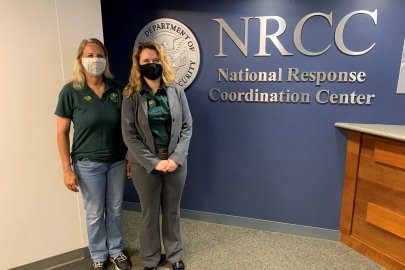The Department of Energy’s Office of Cybersecurity, Energy Security, and Emergency Response (CESER) works closely with Federal agencies to provide planning and emergency response support to state, local, and energy sector partners ahead of and during hurricanes and other natural disasters. Learn more about how DOE coordinates response and recovery.
Be sure to follow @DOE_CESER on Twitter for information and updates.
DOE Emergency Support Function (ESF) #12 responders are deployed to support FEMA and state partners' energy restoration efforts in response to Hurricane Helene.
Situation Reports from Past Seasons
Hurricane News and Resources
-
 June 1 marks the first day of hurricane season in the U.S., which runs until November 30. Prediction models forecast an active hurricane season in 2023, with around 2-3 hurricanes expected to reach Category 3 status.
June 1 marks the first day of hurricane season in the U.S., which runs until November 30. Prediction models forecast an active hurricane season in 2023, with around 2-3 hurricanes expected to reach Category 3 status. -
 Throughout 2022, CESER’s ESF #12 response teams managed numerous rapid deployments and engaged in training and preparedness exercises to stay on top of best practices.
Throughout 2022, CESER’s ESF #12 response teams managed numerous rapid deployments and engaged in training and preparedness exercises to stay on top of best practices. -
 DOE is ready to safely facilitate the restoration of energy systems while protecting public health as the 2020 hurricane season comes underway.
DOE is ready to safely facilitate the restoration of energy systems while protecting public health as the 2020 hurricane season comes underway. -
 A checklist from the Federal Emergency Management Agency for building an emergency supply kit
A checklist from the Federal Emergency Management Agency for building an emergency supply kit -
 Advice from the Federal Emergency Management Agency on preparing an emergency kit tailored to your household
Advice from the Federal Emergency Management Agency on preparing an emergency kit tailored to your household -
During any disaster, Department of Energy emergency responders are prepared to work with their partners to aid in restoring power to those impacted.
-
 A tool from the Energy Information Administration to help identify potential threats to energy infrastructure from natural disasters
A tool from the Energy Information Administration to help identify potential threats to energy infrastructure from natural disasters -
 Advice from the Federal Emergency Management Agency on preparing for and surviving during a hurricane.
Advice from the Federal Emergency Management Agency on preparing for and surviving during a hurricane. -
 The Federal government works closely every year with industry and government partners to prepare for hurricane season which begins on June 1.
The Federal government works closely every year with industry and government partners to prepare for hurricane season which begins on June 1.


